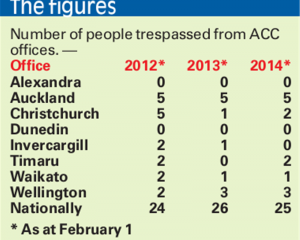The decision, in favour of Karen McGrath, came after three years of unsuccessful appeals.
It amounted to a "judicial dressing down" by the highest court in the land of the way the lower courts had handled the case and of ACC's approach, said Dunedin lawyer Peter Sara, from Mrs McGrath's legal team.
The decision emphasised ACC must comply with legal restrictions over assessing injured claimants as fit for full-time work.
Mrs McGrath's left ankle was badly injured in 2002 and she has since experienced chronic pain, which limits her to working part-time, currently 11 hours a week of office work, at King's High School, Dunedin.
She is delighted at the court outcome. "It's just amazing to think that a little person like myself could win against ACC," she said.
She was "gutted" ACC had not taken more seriously her chronic pain issues, which prevented her from working full-time, as doctors had confirmed.
The decision involved Section 110 of the ACC legislation which prevents ACC from requiring claimants to undergo "vocational independence tests", unless claimants are likely to be able to undertake full-time work for which they are suited, previously involving 35 hours a week, and now 30 hours.
The Supreme Court judgement said such tests are "intrusive and may be upsetting". The purpose of section 110 (3) was to protect claimants "from unnecessary assessments where there is no real prospect of vocational independence", the court judgement said.
If ACC determines claimants have achieved "vocational independence", weekly earnings-related compensation payments are ended three months after notification.
Supreme Court officials have confirmed that this "important case" is the first ACC matter considered by the court since it was established in 2004.
A judicial review had been sought over an ACC vocational assessment notice, after earlier reviews were unsuccessful in the High Court and Court of Appeal.
The Chief Justice of New Zealand, Dame Sian Elias, and Supreme Court Justices Peter Blanchard, Andrew Tipping, John McGrath and William Young, unanimously upheld the appeal and quashed the notice of assessment sent to Mrs McGrath by ACC in 2008.
The court had to assess the "objective reasonableness" of whether vocational independence was likely to be achieved.
It was "inappropriate" to suggest - as had submissions on behalf of ACC, and as reasoning given in earlier High Court and Court of Appeal decisions seemed to allow - that the court could not apply a "high" standard of scrutiny.
An earlier focus on a "low standard of review" was "an erroneous approach", the justices said.
Mr Sara said the court decision also emphasised the importance of section 110, which ACC had in the past "studiously avoided" addressing, Mr Sara said.
The judgement could have significant implications for other claimants facing vocational independence tests.
It also highlighted the importance of chronic pain as a factor preventing some injured claimants from working a full-time job, he said.
ACC general manager claims management Denise Cosgrove said this was "an historic case" and the ACC checks recommended in the judgement were "already in place".
"In this specific case the Supreme Court decided we did not have sufficient, up-to-date information on the client's injury before we made the decision to have the client assessed."
ACC had a "quality assurance process" in place - involving reviews and quality checks - which aimed to ensure that a decision to refer a client for a vocational independence assessment was "robust".





